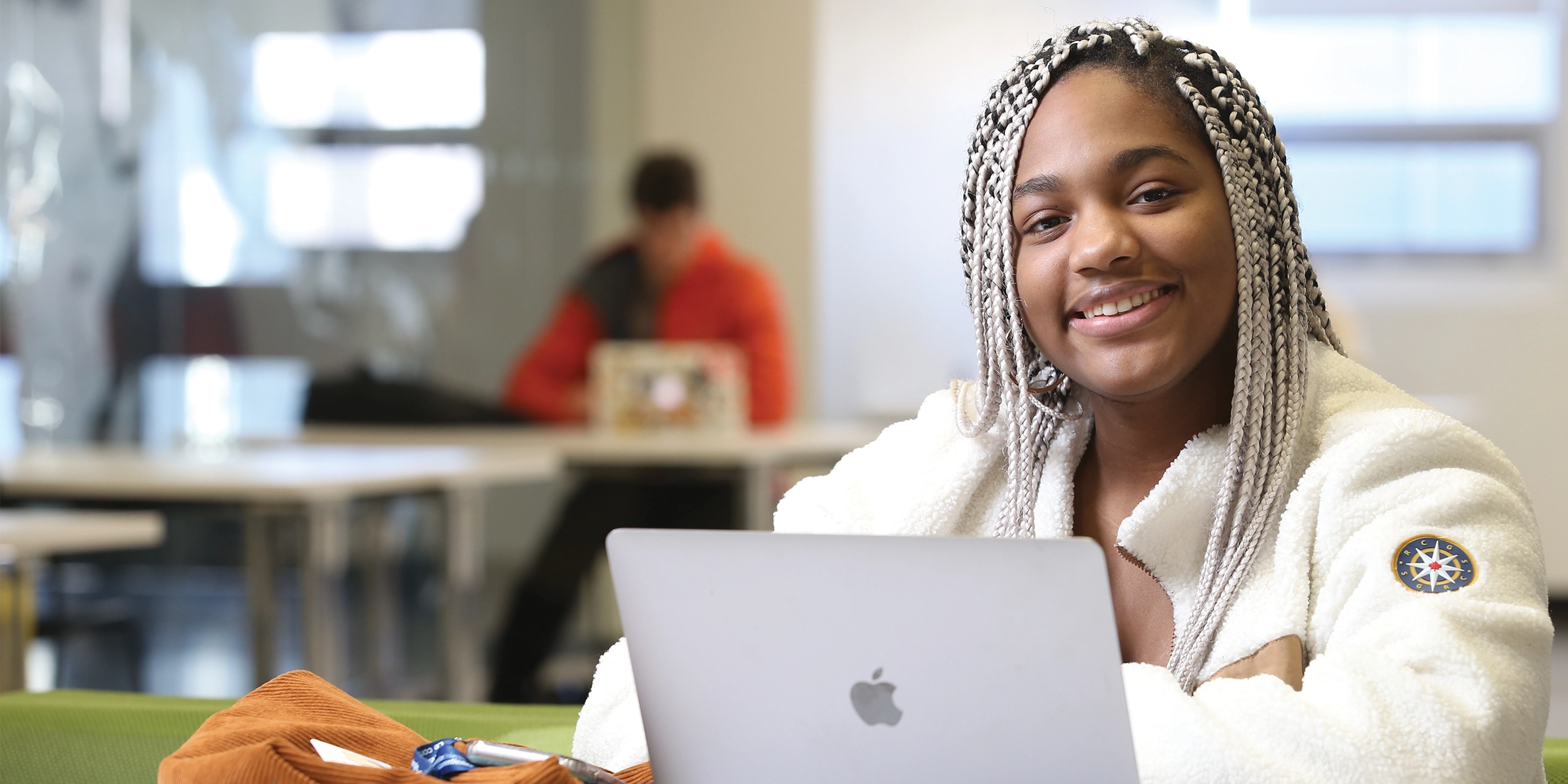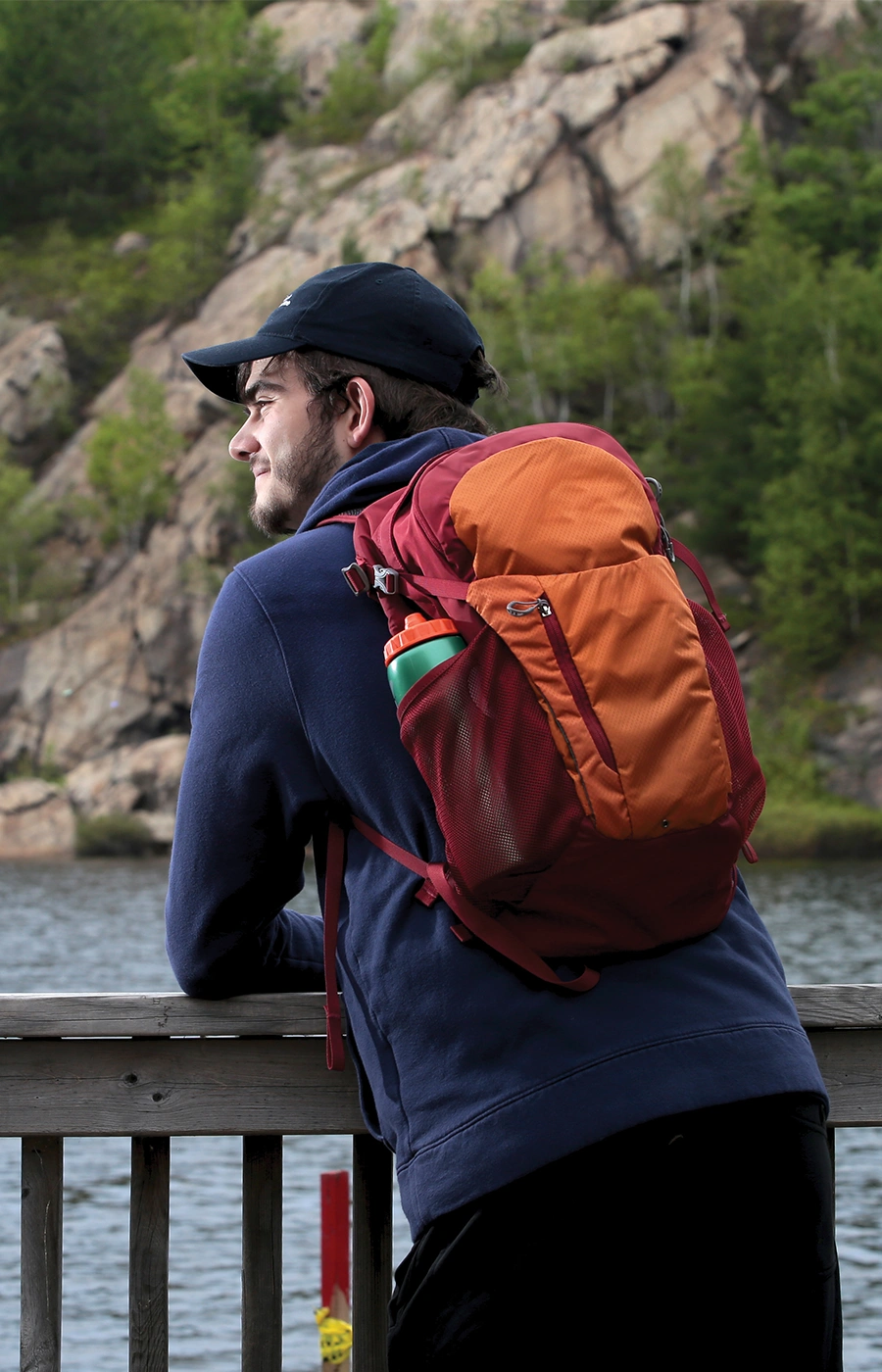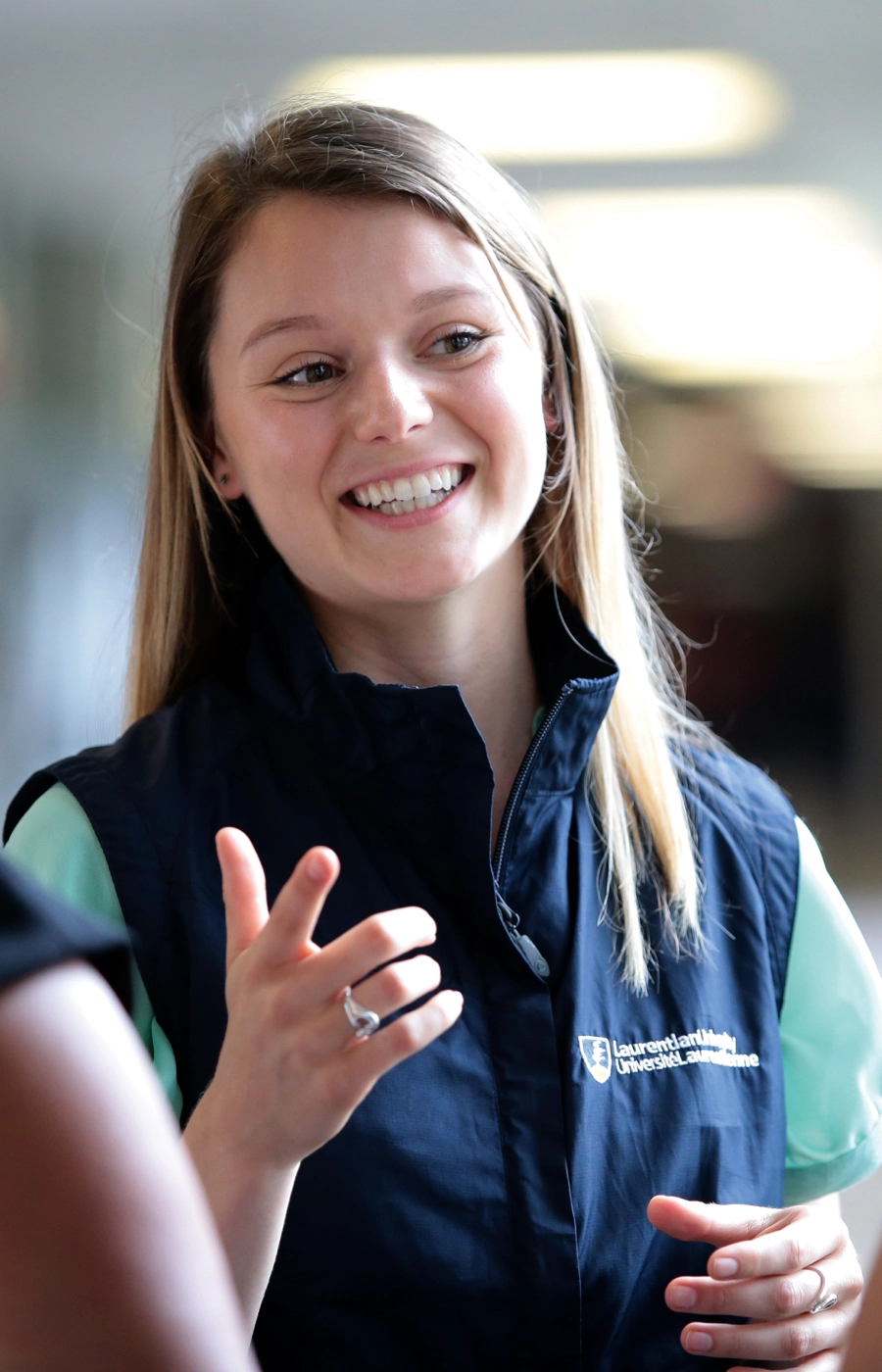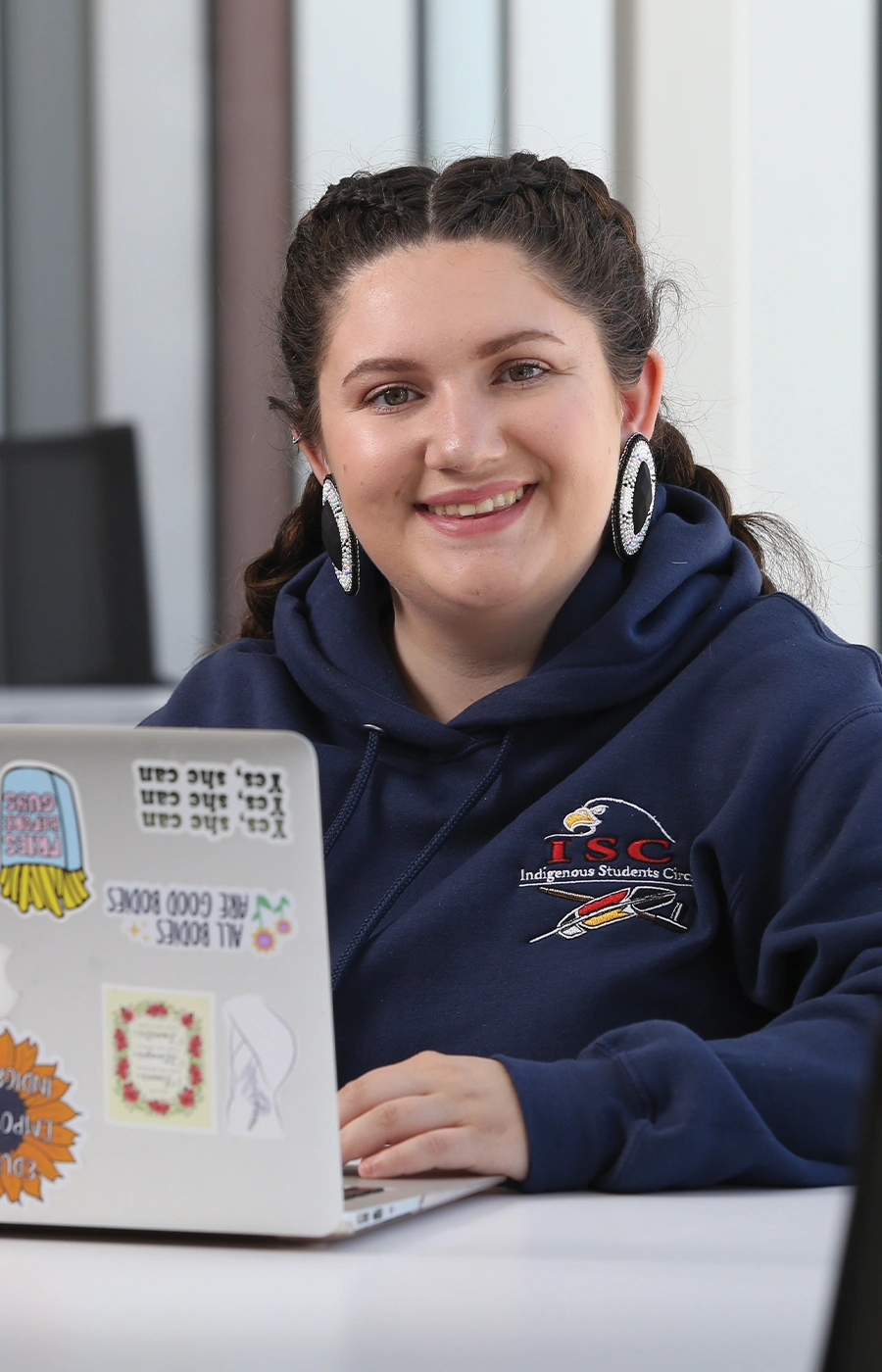
Human Kinetics (MHK)
Faculté d'éducation et de la santé
Complete research related to physical education, sport, fitness, health, or wellness within Canadian and international contexts.

Survol du programme
Discover the science of sport, physical exercise, and how it applies to human health.
Complete research related to physical education, sport, fitness, health, or wellness within Canadian and international contexts with the Master of Human Kinetics program at Laurentian University. Develop your knowledge and practical skills related to community health promotion, chronic disease prevention, and rehabilitation. You can also apply your focus to biomechanics, exercise physiology, psychomotor behaviour, sport psychology, and the psycho-social contributions to human movement.
Master of Human Kinetics students can choose between two streams:
- Major Paper Stream - The Major Paper option involves 18 credits of coursework and 6 credits involving the completion of a paper related to the detailed analysis and synthesis of a human kinetics topic.
- Thesis Option - The Thesis option involves 12 credits of coursework and 12 credits involving the completion of a thesis based on an in-depth investigation of a topic related to human kinetics.
Topics of research may include, but are not limited to, the following:
- Biomechanics
- Ergonomics
- Exercise and Environmental Physiology
- Health and Physical Education
- Health Promotion and Wellness
- History and Sociology of Sport
- Multi-Cultural Physical Activity and Sport
- Occupational Health and Safety
- Outdoor Adventure and Experiential Education
- Professional Development
- Sport and Exercise Psychology
- Sport Performance
Gain hands-on research and applied experience with the optional internship course.
Complete the program with a combination of coursework and completion of a thesis or major paper.
Benefit from guidance and counselling for your thesis or major paper preparation from your supervisor and committee or second reader.
Perspectives de carrière
Graduates will have a choice of career paths in a number of diverse sectors such as health, education, industry, and other private enterprises; or they may pursue doctoral studies at Laurentian University or at some other institution. Given the aging population of Ontario (and across Canada) as well as the increasing emphasis on preventive health care and wellness, the demand for people trained in associated fields is projected to increase rapidly in the next five to ten years.
Détails du programme
Langue du programme:
Anglais
Mode de présentation:
Sur campus
Veuillez écrire à l’adresse courriel ci-dessus et notre équipe de recrutement vous répondra!
En savoir plus sur le programme
The Master’s of Human Kinetics (MHK) is a two-year graduate degree program requiring the completion of 24 credits involving either a Thesis or Major Paper option. It offers a wide breadth of topics to study. It can range from the science of sport to physical exercise, outdoor education, and well-being. Topics usually relate to human health or performance and reflect a physiological, biomechanical, psychological, or social perspective. Despite the diversity of individual research topics students may pursue, the MHK program is designed to achieve specific learning outcomes.
Program Learning Outcomes
Upon completion of the MHK program, students will be able to:
- Demonstrate a breadth of knowledge in human kinetics and health-related research.
- Use established techniques of research and inquiry to create, analyze, and interpret knowledge in the discipline.
- Demonstrate proficiency in critically appraising research studies in the field of human kinetics and health.
- Demonstrate academic curiosity for research outside of their field, to expand their creativity and capacities as researchers.
- Communicate their research in academic settings including, but not limited to, course assignments, peer groups, and conferences.
- Structure their thesis or major paper in a coherent way to address a gap or need in their field.
- Assess and address ethical considerations related to their research projects (thesis or major paper).
- Explain the limitations of their research, and understand their scientific and philosophical stances.
- Demonstrate professional capacity by independently planning, managing, and meeting deadlines and milestones throughout all stages of their autonomous project (thesis or major paper).
- Communicate and collaborate effectively with their faculty supervisor and committee.
- Defend their thesis or major paper, in order to demonstrate a depth of knowledge in their field of study.
- Engage in professional development opportunities including participation and presentation(s) at research workshops, conferences, and/or symposiums.
Exigences d’admission
The admission requirements are the same for both the Thesis Option and the Major Paper Option. To be admitted, students should hold an appropriate Bachelor's degree at the honours level, or its equivalent, with at least a B+ (75%).
Students entering the Master's in Human Kinetics (MHK) program will hold a 4-year degree in a Human Kinetics field (e.g., Physical and Health Education; Kinesiology; Sports Psychology) or equivalent. Candidates who have graduated from a three-year degree program in a related discipline may be admitted to a qualifying year. Candidates with an honours degree in a related field such as Life Sciences, Sports Administration, Nursing Science, Rehabilitation Therapy, Sociology, Psychology, Physiology, Mechanical Engineering, Biology and Biochemistry, to name a few, may be admitted to the MHK program. However, such candidates may be required to enroll in undergraduate courses in the School of Human Kinetics to round out their academic preparation if deemed necessary by the admissions committee (students will be informed of this decision before being admitted to the program).
The following competencies are important prerequisites for student success in the MHK program: (1) thinking critically and creatively; (2) reading and comprehending scientific literature; (3) communicating effectively in written and oral contexts; and (4) understanding and applying logical and ethical arguments. The application process requires students to submit documents that will be used, in part, to assess these competencies.
Application Process
According to their area of interest, students are required to identify a faculty member who has agreed to supervise them prior to applying to the MHK. Applicants will require: (1) a completed application, (2) an academic Curriculum Vitae (CV), (3) official academic transcripts for all previous post-secondary studies, (4) three reference forms, (5) a completed Faculty Supervisor form, (6) a statement of interest, and (7) any other pertinent information, including language scores if applicable.
The following steps are recommended to apply to the MHK program:
Step 1:
Students should carefully review this webpage and contact the Program Coordinator or an individual faculty member about the possibility of becoming an MHK student.
Students are encouraged to consult the faculty listed on this page in order to identify a potential Faculty Supervisor (i.e. a faculty member they would like to work with). Alternatively, they are advised to contact the MHK Coordinator, who will help them to identify a potential Supervisor. Contacting a faculty member directly is best, as the communication leads to discussions on potential thesis or major paper topics and the availability of funding.
It is highly recommended that students carefully review potential Faculty Supervisors’ research interests and recent publications to ensure that a student and Faculty member’s research interests are aligned and that students are prepared. It is common for potential Faculty Supervisors to request students to send some application documents (i.e. CV, academic transcripts, and/or statement of interest) for review prior to agreeing to supervise a student.
Most international students are required to provide a course-by-course evaluation of official transcripts (WES) and evidence of English language proficiency by submitting test scores (TOEFL, IELTS, or CAEL MELAB). Potential Faculty Supervisors often also require this information prior to agreeing to supervise an international student.
Step 2:
To apply, click here. Once students have applied, they will receive instructions from the Office of Admissions leading them to the myLaurentian Portal. Students can access the portal at my.laurentian.ca; sign-in credentials will be provided in the correspondence received from the Office of Admissions upon successful completion of an application. The following documents will be required in order to complete an application.
Required Documents:
- Three Reference Forms (to begin the process at my.laurentian.ca, click on "Reference Submission" on the left-hand navigation menu)
- Statement of Interest (to be uploaded via MyLaurentian; max 750 words)
- Faculty Thesis Supervisor Form, available by clicking here.
- Curriculum Vitae and/or Resume (to be uploaded via MyLaurentian)
- Official Academic Transcript(s) from all post-secondary studies* (Please note that current or prior Laurentian University students do not need to request transcripts)
*Please note that official transcripts must come directly to the Office of Admissions from the previous post-secondary institution by requesting at the time of your application or by contacting the institution's Registrar's Office.
Step 3:
Once the Admissions Office receives all information and the application is deemed complete, the application will be forwarded to the MHK Coordinator. The MHK Coordinator will then share the application with the MHK Admissions Committee for review and assessment.
Step 4:
The MHK Admissions Committee will review all applications on file and make a decision regarding the suitability of each applicant. The MHK Admissions Committee will then make a recommendation to the Dean of the School of Graduate Studies at Laurentian University. The Graduate Studies office will verify the dossier and if satisfactory, the Dean of Graduate Studies will forward the recommendation for admission to the Office of Admissions at Laurentian University.
Step 5:
If approved for admission, the Office of Admissions will send the student an Offer of Admission via MyLaurentian. Applicants wishing to accept the offer of admission must indicate their response on MyLaurentian within three weeks of receiving the offer. Once the student has accepted the offer, a transition to the registration process occurs.
Important Admission Dates
Applications are accepted from September to April each year on an ongoing basis; however, it is recommended that all students plan to start in the fall semester (i.e. September)
- Thesis students can start their studies in September, January, or May each year after they have been offered admission.
- Major Paper students can only start their studies in September each year after they have been offered admission.
The MHK Admissions Committee will review completed application(s) and make admission recommendation(s) to the Dean of Graduate Studies:
- Within two to three weeks of receiving a completed application(s).
The Dean of Graduate Studies will review recommendation(s) of the MHK Admissions Committee and make a recommendation to the Office of Admissions:
- Within two weeks of receiving recommendation(s) from the MHK Admissions Committee.
The Office of Admissions will send Offers of Admission:
- Within two weeks of receiving recommendation(s) for admission from the Dean of Graduate Studies.
The applicant(s) will have until this date to respond to their offer via myLaurentian:
- Three weeks after the Offer of Admission is received.
If you have any questions regarding the admissions process, in general, please contact admissions@laurentian.ca.
Comment déposer une demande
Pour faire une demande aux études supérieures, vous devez déposer votre demande d’admission auprès du Centre de demande d'admission aux universités de l'Ontario (CDAUO).
Pour obtenir des instructions détaillées sur le processus de demande d'admission, veuillez consulter les pages suivantes :
- Comment déposer une demande : Candidats canadiens aux cycles supérieurs
- Comment déposer une demande : Candidats internationaux aux cycles supérieurs
Déposer une demande en tant que candidat aux cycles supérieurs
Options de diplôme
Students must follow these regulations while in the Faculty of Graduate Studies.
Approved Fields of Study
-
Human Kinetics
Master in Human Kinetics (MHK) (Thesis Option):
PHED 5000E Research Thesis (12 cr)
PHED 5126E Research Methods in Human Kinetics
PHED 5136E Qualitative Methodologies in Human Kinetics
OR PHED 5146E Quantitative Methods in Human Kinetics
6 credits of elective courses; up to a maximum of 3 credits at 4000 level, and remainder at 5000 or 6000 level.
**Full-time Masters students are encouraged to complete their Thesis Proposal prior to the end of the 12th month of study within the program.
Master in Human Kinetics (MHK) (Major Paper Stream):
PHED 5006E Major Paper
PHED 5007E Major Paper II
PHED 5116E Seminar in Multi-Cultural Sport
PHED 5126E Research Methods in Human Kinetics
PHED 5216E Seminar in Occupational Health, Safety and Wellness
One of the following courses:
IRNH 6306E Perspectives on Indigenous Health and Wellness
MIRE 5006E Indigenous Relations and Worldviews - Theory and Practice
MIRE 5046E The United Nations and International Indigenous Issues
MIRE 5056E Natural Resources and the Environment From Indigenous Perspectives
MIRE 5066E Indigenous Relations in Community Contexts
SCOM 4006E Presenting and Communicating Research
3 credits of elective courses from the 4000, 5000 or 6000 level
Exemples de cours
This course involves the completion of a thesis based on an in-depth investigation of a topic related to human kinetics. The process utilizes qualitative, quantitative, or mixed methods to address a research question or hypothesis. The course covers the development, proposal, and defence of the thesis. cr 12.
This course is designed to give students an in-depth understanding of current topics in Human Kinetics and is to be run on a weekly basis. The course will encourage students to learn how to research, discuss and evaluate current information in order to form cogent arguments and opinions about research topics. Selected topics in Human Kinetics will be discussed in the form of themes. Students will gain a clear and thorough understanding of each theme through literature research, discussion and debates, and will express part of their understanding in an opinion paper. The course will emphasize research advancements in the areas of interest highlighted by the various thesis topics within the group. Emphasis will be placed on understanding the mechanisms and concepts that currently drive leading research in the field. (exp 3) cr 3.
This course is designed to give students an in-depth understanding of current topics in Human Kinetics and is to be run on a weekly basis. The course will encourage students to learn how to research, discuss and evaluate current information in order to form cogent arguments and opinions about research topics. Selected topics in Human Kinetics will be discussed in the form of themes. Students will gain a clear and thorough understanding of each theme through literature research, discussion and debates, and will express part of their understanding in an opinion paper. The course will emphasize research advancements in areas of interest highlighted by the various thesis topics within the group. Emphasis will be placed on understanding the mechanisms and concepts that currently drive leading research in the field. (exp 3) cr 3.
This course covers the critical appraisal of research and analyses in diverse qualitative, quantitative, and mixed methods approaches. Strategies for developing the thesis or major paper proposal, as well as ethics application requirements are addressed. The course also focuses on the student's professional development as an emerging scholar. (lec 3) cr 3.
This course addresses qualitative research methodologies used for investigation within sport and physical activity. The course covers ontology, epistemology, conceptual issues, qualitative designs, data collection, data analysis, ethics, and dissemination of results. (lec 3) cr 3.
This course addresses quantitative research methods used for the investigation of sport and physical activity. The course covers quantitative designs, data collection, parametric and nonparametric statistics, data analysis, and dissemination of results. (lec 3) cr 3.
This course involves the development of in-depth knowledge on a current topic related to human kinetics. Research, clinical, or community learning experiences may be included. (lec 3) cr 3.
This course involves the development of in-depth knowledge on a current topic related to human kinetics. Research, clinical, or community learning experiences may be included. (lec 3) cr 3.
This course involves the in-depth study of a topic related to the student's program of study at a Master's level. The learning experiences may include research in a particular topic area with either a university or community researcher. (exp 3) cr 3.
This course involves the development of in-depth knowledge and experience while on a placement related to the student's program of study at the Master's level. The learning experiences may include research, clinical, or community experiences in a placement with university or community practitioners. (exp 3) cr 3.
Membres du corps professoral
Prêt(e) à passer à la prochaine étape?
Nous sommes là pour vous aider à commencer votre parcours à Laurentienne.



